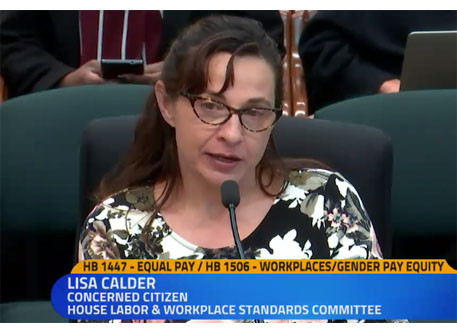STATE GOVERNMENT
Strong support in Olympia for Equal Pay Opportunity Act
OLYMPIA (Jan. 25, 2017) — The House Labor and Workplace Standards Committee heard compelling testimony Tuesday from advocates, workers and business owners in support of two bills intended to help close the gender pay gap.
 HB 1506, the Equal Pay Opportunity Act sponsored by Rep. Tana Senn (D-Mercer Island), addresses income disparities, employer discrimination and retaliation practices, and reaffirms Washington’s longstanding pursuit of equality in the workplace. The bill would update the existing Washington State Equal Pay Act — not updated since its passage in 1943 — by prohibiting pay secrecy policies, allowing discussion of wages and prohibiting retaliation for asking for equal pay.
HB 1506, the Equal Pay Opportunity Act sponsored by Rep. Tana Senn (D-Mercer Island), addresses income disparities, employer discrimination and retaliation practices, and reaffirms Washington’s longstanding pursuit of equality in the workplace. The bill would update the existing Washington State Equal Pay Act — not updated since its passage in 1943 — by prohibiting pay secrecy policies, allowing discussion of wages and prohibiting retaliation for asking for equal pay.
“My bill is about ensuring economic security for Washington families, at the same time as we strengthen the economy,” said Senn, who sponsored a similar bill during the last biennium. That bill twice passed the House with bipartisan support, but Sen. Michael Baumgartner (R-Spokane), chair of the Senate Commerce & Labor Committee, wouldn’t allow it to advance from his committee.
While salary information is usually openly available in public sector jobs, one third of private firms actively discourages or bans employees from discussing their pay with co-workers, making it impossible for them to know if they are being underpaid. This legislation will allow workers to discuss their pay, which will help all employees to better understand their positions and determine if their pay is fair.
 Lisa Calder, a UFCW Local 21 member who has worked at QFC for seven years, explained why she supports HB 1506.
Lisa Calder, a UFCW Local 21 member who has worked at QFC for seven years, explained why she supports HB 1506.
“As a meat wrapper, I found myself fairly consistently doing the same work as a manager but for less pay and this went on for years,” Calder said (watch her testimony on TVW). “When he got promoted, I saw an opportunity to move into his management role and see a pay increase. Since I had already been doing the management job, I thought I would be a great candidate. Instead of hiring a new manager, they left the post open and I continued doing the same work without any pay increase the promotion would have brought. Eventually, they did fill the position and hired another man in that role.”
The committee also heard HB 1533, sponsored by Rep. Laurie Dolan (D-Olympia), which would prohibit employers from seeking job applicants wage and salary history or requiring that the wage or salary meet certain criteria.
 “Prior discrimination becomes current discrimination if a job’s compensation is based on the past,” testified Lynne Dodson, Secretary Treasurer of the Washington State Labor Council, quoting an article by Bourree Lamm in The Atlantic. “The use of salary histories guarantees that salary bias follows workers wherever they go, whatever the profession, no matter their skills.”
“Prior discrimination becomes current discrimination if a job’s compensation is based on the past,” testified Lynne Dodson, Secretary Treasurer of the Washington State Labor Council, quoting an article by Bourree Lamm in The Atlantic. “The use of salary histories guarantees that salary bias follows workers wherever they go, whatever the profession, no matter their skills.”
Income disparities limit a woman’s ability to provide for her family, which leads to higher rates of poverty among women and children. It also leads to significantly greater poverty among elderly females. Women decide on most everyday items, like groceries and clothing, but if they take home a smaller check, they have less spending power.
The National Women’s Law Center reports that, at $.79 for every dollar paid to men, Washington state ranked 25th in the 2015 Wage Gap State Rankings. The national average is $.80. African American and Latina women fare worse, making $.61 and $.46 respectively, for every dollar paid to white men.
In its “Simple Truth About the Gender Pay Gap” report, the American Association of University Women found that, while the wage gap has narrowed over the past five decades due largely to women’s progress in education and workforce participation, it is still sizeable. Progress has stalled since the turn of the century and if change continues at such a slow rate, women will not reach pay equity with men until 2152.
Watch Tuesday’s entire committee hearing on TVW here.





